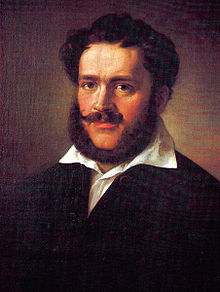- Miklós Wesselényi
-
The native form of this personal name is hadadi báró Wesselényi Miklós. This article uses the Western name order.
Miklós Wesselényi 
Miklós Wesselényi in the painting of Miklós Barabás (1836)Born Miklós Wesselényi
December 20, 1796
JibouDied April 2, 1850 (aged 53)
on the way returning to Hungary from GräfenbergResting place Budapest Nationality Hungarian Ethnicity Hungarian Citizenship Hungary Known for His political activity Home town Jibou Religion Calvinist Parents Ilona Cserei and Miklós Wesselényi Baron Miklós Wesselényi de Hadad (pronounced [ˈmikloːʃ ˈvɛʃɛleːɲi] December 20, 1796 – April 2, 1850), was a Hungarian statesman, leader of the upper house of the Diet, member of the Board of Academy of Sciences, hero of the 1838 Pest flood. A prominent and wealthy Hungarian aristocrat, son of Baron Miklós Wesselényi and Ilona Cserei, he was born at Jibou, and was educated at his father's castle by Mózes Pataky in the most liberal and patriotic direction. He inherited his father's exceptional physical strength, and he further trained himself in different sports, such as horse-riding and swimming. He was a celebrity in his age for his sportsman's accomplishments.
Contents
Early career
Wesselényi entered politics in 1818, taking minor positions at numerous County Diets, as was customary with the upper nobility his family belonged to. He went on a grand tour of Western Europe with his friend, Count Stephen Széchenyi in 1821-22. Realizing their native Hungary's need to catch up with the development of other European states, they become leading figures of the progressive opposition in the Upper House, promoting a program of reform and economic and national development. Hungary was under the foreign rule of the Habsburg emperors, who treated any native reform movement with deep suspicion. The Habsburg government, fearing unrest and independence efforts, took increasingly oppressive measures to curb the nationalist movement.
Accomplishments
Wesselényi abolished several feudal laws and customs on his own estates, freed his serfs, built and ran schools on his own money, and organized lectures on modern agriculture for his former subjects. He established a printing press in Cluj-Napoca to promote his ideas.
In the Diet of 1834, he became one of the political leaders of the opposition. He held several speeches on current topics attacking feudal institutions, and printed and distributed the minutes of the Diet in order to give publicity to the debates. For these activities, the government took him to trial for inciting unrest, operating a printing press without royal permission, and also for one of his speeches, where he called for general land-redemption. His long-lasting trials (two at the same time) became a focal point of the country's political life and reform movement. His legal representative was Ferenc Kölcsey.
In 1833 he published a political book titled Prejudices (Balítéletek), which was immediately banned by the Habsburg government.
During the 1838 Pest Flood, he saved many lives by rowing about the inundiated city and rescuing people from rooftops, gaining nationwide admiration.
Prison
Finally his trials ended and he was sentenced to 3 years in prison. After serving 2 months in the casemates of the Buda castle, he started to suffer from a serious eye ailment, and he was permitted to travel to Gräfenberg (Lázně Jeseník), in Moravia with his family in order to cure his illness. He returned in 1843, almost completely blind and a wreck of his former self. He moved back to Jibou, and served in minor positions within the local county government.
Last years
Seriously ill, he still took part in the initial stages of the Hungarian Revolution of 1848, and had a key role in persuading the Transylvanian Diet to proclaim union with Hungary, one of the important goals of the Revolution. Seeing the development and radicalization of the events, similar to his friend, Count Széchenyi, and also many from the reform-minded aristocracy, he also become disillusioned. In September 1848 he left the country under the pretext of continuing his medical treatment in Gräfenberg. He stayed there, accompanied by his wife, Anna Lux, who faithfully supported and tended him through his illness.
Wesselényi died in 1850, on the way returning to Hungary from Gräfenberg.
Among his other accomplishments, he is remembered for his support of the development of Hungarian agriculture, the introduction and extension of the silk industry, and his support for children's homes and child care. He was elected to the Board of the Hungarian Academy of Sciences in 1830, and in 1831 he received honorary membership of the institution.
From 1902, a statue of Wesselényi by artist János Fadrusz has stood in the center of Zalău.
-
Statue of Miklós Wesselényi built in 1902 in Zalău by János Fadrusz
References
 This article incorporates text from a publication now in the public domain: Chisholm, Hugh, ed (1911). Encyclopædia Britannica (11th ed.). Cambridge University Press.
This article incorporates text from a publication now in the public domain: Chisholm, Hugh, ed (1911). Encyclopædia Britannica (11th ed.). Cambridge University Press.
External links
- (Hungarian) http://epa.oszk.hu/00900/00979/00012/02egyed.htm
Categories:- People from Jibou
- Hungarian politicians
- 1796 births
- 1850 deaths
- Calvinist politicians
- Blind people
-
Wikimedia Foundation. 2010.



